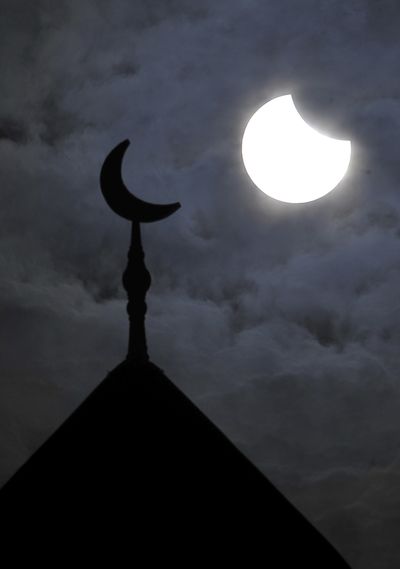Solar eclipse casts shadow over Asia
Rare event won’t recur for more than a century

TAREGNA, India – The longest solar eclipse of the 21st century pitched a swath of Asia from India to China into near darkness today as millions gathered to watch the phenomenon.
But millions more, gripped by fear, shuttered themselves in. India abounds in superstitions and fables based on Hindu mythology, one of which says an eclipse is caused when a dragon-demon swallows the sun.
The eclipse is caused when the moon covers the sun completely to cast a shadow on Earth. In some parts of Asia it lasted as long as 6 minutes and 39 seconds.
Thick cloud cover over India obscured the sun when the eclipse began at dawn. But the clouds parted in several cities, minutes before the total eclipse took place at 6:24 a.m. In neighboring Bangladesh, people came out in droves.
“It’s a rare moment, I never thought I would see this in my life,” said Abdullah Sayeed, a college student who traveled to Panchagarh town from the capital Dhaka to view it.
He said cars in the town needed to use headlights as “night darkness has fallen suddenly.” People hugged each other and some blew whistles when the eclipse began, he said.
One of the best views, shown live on several television channels, appeared to be in the Indian town of Varanasi, on the banks of the Ganges river, sacred to devout Hindus.
Thousands of Hindus took a dip in keeping with the ancient belief that bathing in the river at Varanasi, especially on special occasions, cleanses one’s sins. The eclipse was seen there for 3 minutes and 48 seconds.
It is the longest such eclipse since July 11, 1991, when a total eclipse lasting 6 minutes, 53 seconds was visible from Hawaii to South America. There will not be a longer eclipse than Wednesday’s until 2132.
“We’ll have to wait a few hundred years for another opportunity to observe a solar eclipse that lasts this long, so it’s a very special opportunity,” said Shao Zhenyi, an astronomer at the Shanghai Astronomical Observatory.